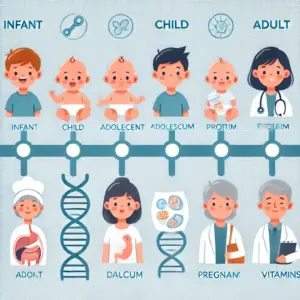Nutritional Needs Across the Lifespan

Understanding the nutritional needs at different stages of life is crucial for maintaining health and well-being. Our dietary requirements change as we age, influenced by growth, activity levels, and metabolic changes. Let’s explore the nutritional needs from infancy to old age.
Nutritional Needs Infants
During infancy, rapid growth and development require high nutrient intake relative to body size. Breast milk or formula provides essential nutrients, including proteins, fats, carbohydrates, vitamins, and minerals. Key nutrients for infants include:
- Iron: Crucial for brain development and preventing anemia.
- Vitamin D: Important for bone health, often supplemented in breastfed infants.
- Omega-3 fatty acids: Essential for brain development.
Nutritional Needs Children
As children grow, their energy and nutrient needs increase. A balanced diet that includes a variety of foods from all food groups is vital. Key nutrients include:
- Calcium and Vitamin D: Essential for bone growth and development.
- Protein: Supports growth and tissue repair.
- Fiber: Promotes digestive health.
- Iron: Important for cognitive development and preventing anemia.
Nutritional Needs Adolescents
Adolescence is marked by rapid growth and hormonal changes, increasing the need for calories and nutrients. Important considerations include:
- Protein: Supports muscle growth and development.
- Calcium and Vitamin D: Critical for bone mass accrual.
- Iron: Particularly important for girls to replace menstrual losses.
- Folate and Vitamin B12: Support cellular growth and division.
Nutritional Needs Adults
Nutritional needs in adulthood focus on maintaining health and preventing chronic diseases. A balanced diet that includes all food groups is essential. Key nutrients include:
- Protein: Maintains muscle mass and supports repair.
- Healthy fats: Support heart health and cognitive function.
- Fiber: Aids in digestion and helps control weight.
- Vitamins and minerals: Ensure overall health and proper body function.
Nutritional Need Pregnant and Lactating Women
During pregnancy and lactation, nutrient needs increase to support the mother and developing baby. Important nutrients include:
- Folic Acid: Prevents neural tube defects in the developing fetus.
- Iron: Supports increased blood volume and prevents anemia.
- Calcium and Vitamin D: Support fetal bone development.
- Protein: Essential for tissue growth and repair.
Nutritional Needs Elderly
Aging brings changes in metabolism, digestion, and nutrient absorption. Nutritional needs for older adults focus on maintaining health and preventing age-related diseases. Key nutrients include:
- Protein: Helps maintain muscle mass and strength.
- Calcium and Vitamin D: Prevent osteoporosis and maintain bone health.
- Vitamin B12: Essential for nerve function and may need supplementation due to decreased absorption.
- Fiber: Supports digestive health and prevents constipation.
- Antioxidants: Help combat oxidative stress and reduce inflammation.

Conclusion
Understanding and addressing the nutritional needs at each stage of life is essential for promoting health and preventing diseases. A balanced diet rich in a variety of nutrients supports growth, development, and overall well-being from infancy through old age. By paying attention to these changing nutritional requirements, we can ensure better health outcomes across the lifespan.
